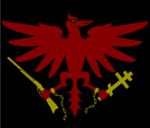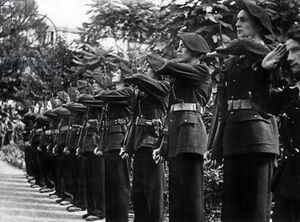People's Action
People's Action Action Populaire | |
|---|---|
 | |
| Abbreviation | AP |
| Leader | Hugo Lysandre Dellague |
| Party leader | Hugo Lysandre Dellague |
| Founder(s) | Alphonse Mérain |
| Founded | 6 November 1896 |
| Headquarters | Port-Rouge, Bayave |
| Newspaper | Le Peuple de Florentie (The People of Florentia) |
| Membership (2023) | 8,293,113 |
| Ideology | Florentian populism • Utopian socialism • Religious socialism • Left-wing populism • National-syndicalism • Dirigisme • Progressivism • Multiculturalism • Monarchism • Federalism • Militarism • Imperialism • World domination Historical: Agrarian socialism Christian socialism |
| Political position | Left-wing to Far-left |
| Colors | Dark red |
| Slogan | Amour, foi, bienveillance Love, faith, benevolence |
| Anthem | Le fou rire |
| Seats in the People's Tribunate (Florentia) | 141 / 300
|
| Seats in the Legislative Body (Florentia) | 148 / 200
|
The People's Action (Lysian : Action Populaire), also known as the AP, is a Florentian populist political party. It is by far the biggest party of Florentia regarding membership. It has been formed in 1896 as a reaction to the abuses of the landowners over the rurals, by Alphonse Mérain, a disciple of former Chancellor Eloïse Rougeau. While the party always boiled with revolutionary fervor as sign of discontent against the decentralised and aristocratic nature of the Confederation, the movement further radicalized since 2018, under Hugo Lysandre Dellague.
Name
The name People's Action represents the will of the party, since its foundation, to actively protect the "little people" against the abuses of the slaver nobility, as well as the percieved usurpation of power from the Emperor by said nobility.
The members of the party often refer themselves as "populists".
History
Origins and early years : 1885-1902
After the victory of the slaver aristocracy in the Florentian civil war (1878-1885), Chancellor Camille de Raihac organised the "White Terror". It is a short period (1885-1902) during which the Florentian government encouraged landowner abuses, lynching of the abolitionnist sympathisers, and tried to enforce a serfdom status on the peasantry (without success).
The People's Party grew out of smaller political groups created by populist and progressive figures, inspired by the works of former Chancellor Éloïse Rougeau, known for her progressive, left-wing populist and syndicalist policies. They quickly gathered support in a lower class - laborers, small farmers, slaves - traumatised by the violences of the civil war and the White Terror, and with a fresh souvenir of the rule of Rougeau. The party was officially created in 1896, in Port-Rouge, Florentia, and abolitionnist journalist Alphonse Mérain got elected as its first President. However, they were allowed to run in state and confederal elections only in 1902, after Raihac's death.
Rise to power : 1902-1934
The combination of the civil war and the White Terror led to a significant amount of devastation, especially in the countryside, which crippled the rural Florentian economy. Chancellor Elme Marchait tried numerous time to find a compromise between the nobility and the lower class. While the repressive methods of Raihac's mandate were abandonned and few reforms were enacted, the slowness of the confederal government and the unwillingness of the administration - mostly made of hereditary bureaucrats -, prevented necessary major reforms to be enacted.
This near political deadlock led to the Wild North revolution in 1911, during which the monarchies of three northern Florentian states (Saint-Isidore, Coayard and Narizonia) were overthrowned and replaced by democratic republics. While the revolution was contained by the other states, the unwillingness of Marchait to "spill Florentian blood" dissatisfied the Imperial Army. The former, in which populist and absolutist tendencies were common, tried to coup the Chancellor in 1915, to give the power to the Emperor. The attempt, however, was discovered by the Confederal Bureau of Investigation, the Florentian intelligence. The CBI tried to link the problematic People's Party with the coup but, because of the lack of evidence, the investigation was canceled.
Unlike most Florentian parties, the People's Action wasn't a state-wide but a nation-wide party, which prevented it from carving a significant stronghold and being elected in the democratic states.
Victory and Lamar mandate : 1934-1960
Activism and abolitionnist raids : 1960-2018
Dellague presidency : since 2018
Political programme
The Populist Programme of 1896 was the first programme of the party. It contained the "10 points of populism"
In 2018, the Populist Programme was updated by Hugo Lysandre Dellague to fit his national-syndicalist and fundamentalist thinking.
Party composition
Command structure
Populist party offices
Paramilitary group
In addition to the People's Action proper, there has always been a paramilitary group which "supported" Populist aims. Until 2023, all members of this paramilitary organisation were required to become regular People's Action members first and could then enlist in the group of their choice. However, since the Eight Glorious Days, membership to the paramilitary wing of the party is mandatory between 3 years old and 18 years old, while membership of the party is only optional. A vast system of paramilitary ranks developed. This was part of the process of unification, during which all paramilitary and auxiliary groups were swallowed into the People's Action paramilitary, and thus was flooded with millions of membership applications.
The paramilitary organisation was first named the Brigades of Love (Brigades de l'Amour), as a reference to Jesus' desire for love and equality. Their main operations consisted of raids on plantations to free slaves, as well as charity.
In 2023, the BL became the state police of Florentia and were renamed the Brigades of Mandatory Love and Kindness (Brigades de l'Amour et de la Gentillesse Obligatoires).
